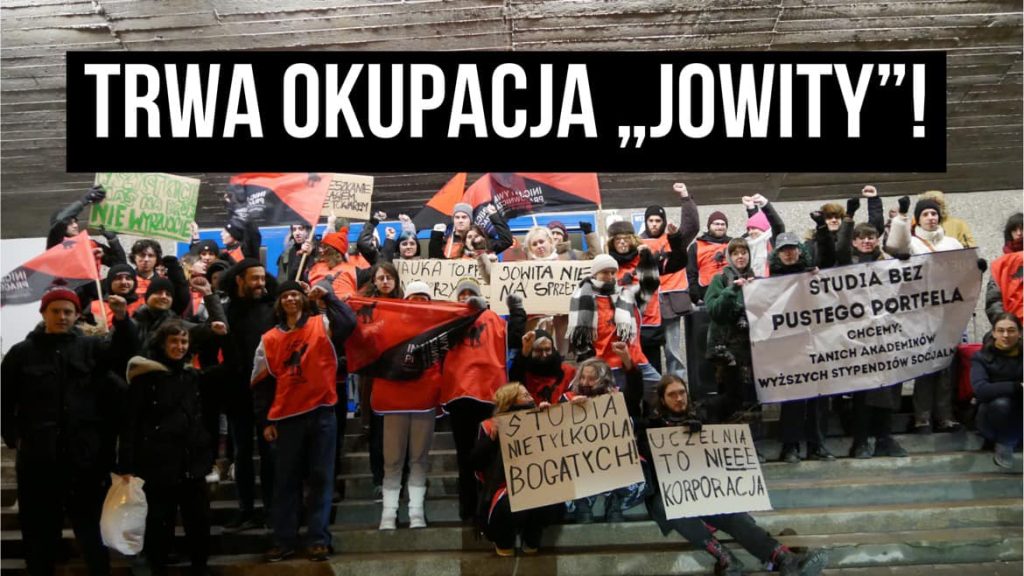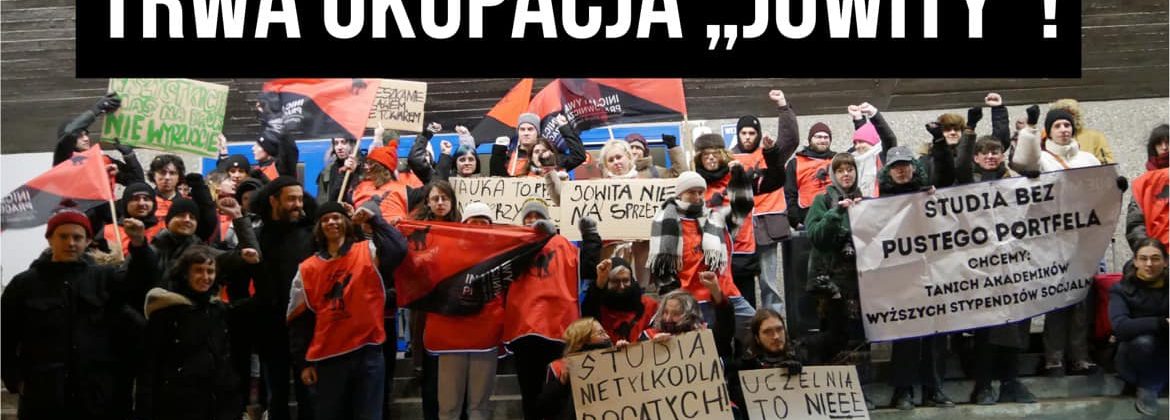
In December 2023 worker-students in Poznan occupied the student dormitory to defend it against demolition. Successfully! They organised teach-ins and invited AngryWorkers to participate and also write an introduction for their ontology of the occupation. Here it is. The occupation of the dorm was supported by comrades from Rozbrat, a long-running social centre that currently asks people to donate for its future. Please do!
AngryWorkers is a small political collective that experiments with revolutionary practice within the working class. In the current moment we start from three basic assumptions.
Firstly, we are in the middle of a deep systemic crisis for which only the global working class can provide a human solution. With the economic crisis, the bloc confrontation, and nationalist tensions increasing, our day-to-day engagement with fellow workers has to start from an internationalist outlook: workers, don’t fight your bosses’ wars. Even when we fight together for better working conditions and wages, the aim of overcoming divisions within the class and encouraging the refusal of nationalist, religious and other divisive ideologies has to be present. Here, we can refer to the actual existence of the working class, which is increasingly pushed to mix and mingle, to migrate, to change jobs within multinational corporations, as a tendency that turns the old phrase into a social reality: workers have no father countries.
Secondly, the emancipation of the working class has to be based on the self-activity and independence of workers. Most traditional worker organisations, like trade unions and parliamentary parties, limit the struggle of workers – and not just the struggle for revolution, but the struggle for the self-defence of existing conditions. Strike laws and union competition weaken strikes. Parliamentary parties, from Podemos to Labour, take the focus away from the real power base of workers: the social production process. Workers already cooperate and produce a global humanity, provide food and shelter for billions – but currently through the narrow and self-interested channels of profits, markets, national bureaucracies, which always impedes a free and conscious cooperation. While workers already cooperate globally, the maintenance of the market and nation state system is wasteful, creates millions of bullshit jobs and destructive industries.
Thirdly, we therefore have to refuse the position of victimhood and take on a social responsibility. In the daily struggle for survival, in the strikes and occupations, we have to learn how to organise social production ourselves. This learning has two main aspects: a social aspect, how to discuss and coordinate decisions consciously and effectively amongst millions; and a technical aspect, which means to share productive knowledge that is currently divided and locked up in various separate social units, such as universities, science departments, factory floors, state departments. This learning process can only take place as a social movement of the working class which slowly breaks down the barriers which the current system erects in order to divide us: the home, the school, the company, the university, the nation. We therefore need working class organisations that self-critically reflect on the various struggles of our class. We don’t need success stories, we need workers’ inquiries. We have to analyse the potentials of self-organisations within the struggles, as a subjective element, and the structure and social dimension of the industry where the struggles take place, as an objective element. Here the developments in the so-called essential industries are of major importance.
In concrete terms we are currently trying to form a political committee and newspaper within two major hospitals. We reflect on the recent strikes of nurses and the experiences of migration of the many international nurses. We see the hospital as a filter for social crisis, where a lot of working class patients end up due to the destruction of communities, the social depression and mental health crisis of our class – and we want to build new worker-patient links. But hospitals are not just care institutions, the cooperation between workers is very complex and many technological aspects are more advanced than in many manufacturing industries. Health workers can therefore be a central part of the social learning process of reappropriating the social means and knowledge of production. We therefore want to analyse the medical science sector – the pharmaceutical and medical device industries – from a working class perspective, in order to demonstrate our social responsibility to come up with a better health system. Here, the contact between normal workers and, for example, medical students is very important and we are looking forward to creating new forms of worker-student collectives.
Our experiments are meant to help create a pragmatic and strategic view of revolution. Revolution is neither a gradual process, nor a spontaneous movement. Workers in the essential industries will have to be able to defend themselves, e.g. against the current attacks on automobile workers world wide, and at the same time, learn to transform their industries materially and socially. Steps on the way are building working class power that can take more and more control over the production process, e.g. the refusal to do harmful or unnecessary labour. These islands of worker control won’t expand gradually, dual power situations don’t last long. In their struggles the working class has to learn how to deal with the repressive arms of the state, with factory lock-outs, with mass arrests or the state’s drive towards military confrontation. The lessons of how to organise our strikes have to go hand in hand with learning how to wield the weapon of mass proletarian violence and targeted insurrection in order to defend strategic industries and communities.



